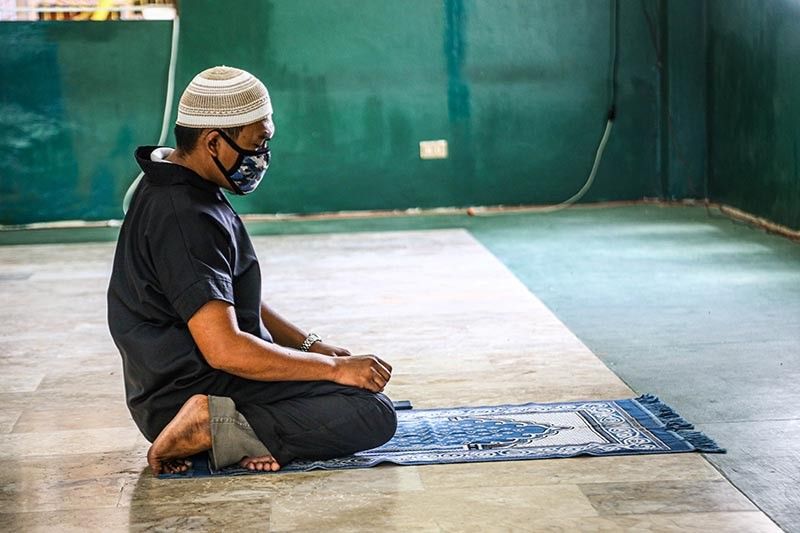Muslim community leaders join legal fight to strike down anti-terrorism law

MANILA, Philippines — Anchoring their petition on documented Islamophobia and the wrongful arrests of Muslims in cases of mistaken identity, Muslim lawmakers, lawyers and a preacher of Islam joined the legal fight to strike down the anti-terrorism law as unconstitutional.
Deputy Speaker Mujiv Hataman (Basilan) and Rep. Amihilda Sangcopan (Anak Mindanao party-list) led the group of eight petitioners in filing a petition for certiorari to ask the Supreme Court to declare Republic Act 11479 as null and void for being unconstitutional.
This is the second plea against the anti-terrorism law filed by Muslim petitioners, following the plea submitted by Bangsamoro lawyers in July.
The petitioners argued that the anti-terrorism law must be declared as void as it violates many of their freedoms, including their rights of religious freedom and free expression.
Like the petition filed by Bangsamoro lawyers, the Muslim petitioners also cited the wrongful arrest and incarceration that Muslims suffer in the government's enforcement of laws.
Martial law, mistaken identity and Islamophobia
The petitioners said that while the Constitution enshrines freedom of expression, “the growing Islamophobia, threats of terrorism and counter-terrorism measures employed by the State have hindered the complete discussion of our beliefs.”
The petitioners noted that history would show that Martial Law during the Marcos dictatorship was felt more sharply by the Muslim community. During martial law, “more than elsewhere in the country, the military might of the state was focused on areas where the country where Muslims live.”
“Many of our elders died under more painful circumstances: Muslim Mindanao was a war zone where no mercy was shown,” they added.
READ: The Forgotten War: Memories of Martial Law in Mindanao
“In Mindanao, especially in Muslim communities, it is a frequent occurrence that mosque-goers, Quran reciters, prayer-callers, even simple market vendors and truck drivers are dragged away by law enforcers—simply on suspicion that they are supporters, relatives, co-conspirators or active participants in acts of rebellion, kidnapping, and what now constitutes terrorism,” the petitioners also said.
The petitioners also cited the September 11, 2001 attack in New York which they said gave rise to Islamophobia and led to the misconception on Jihad as “nothing but holy war” even though it refers to a way for Muslims to “fulfil their faith and actualize Islam.”
According to the Regional Darul-Ifta' of the Bangsamoro Autonomous Region in Muslim Mindanao, "Jihad" is a Muslim's "[exertion of] his utmost effort and capacity in what the religion of All?h requires, such as learning, straightness, commitment, calling to its path, and defending it against aggressors and those who blocked its way by his knowledge, effort, words and his wealth and self."
RDI BARMM notes that although it also means defense of their faith, "the eternal Jih?d (self-struggle) is the one that lasts with the believer for his entire life, that is the greatest Jih?d of the soul, and the great Jih?d enters into that general meaning of Jih?d."
The 9/11 attacks were labelled a “terrorist attack,” petitioners pointed out, and has become conflated with the concept of Jihad.
“This labelling and the way it has been connected to Islam has prevented Muslims from openly expressing their belief in Jihad to avoid suspicion of inciting or proposal to commit terrorism which under the assailed law is already punishable," they said.
This prevents them from delivering sermons on Jihad or teaching the concept to children and their family.
The petitioners said exclaiming “Allahu Akbar,” meant to praise Allah; pointing an index finger to testify oneness with Allah and even possessing the Quran may be seen as allegiance to the Islamic State of Iraq and Syria or indoctrination—bases which can be used to designate them as terrorists.
‘Our fear is not unfounded’
The petitioners also asserted that their fear of the new law is not unfounded.
They mentioned that just before the passage of the law, in February, Police Brig. Gen. Debold Sinas, Metro Manila police chief, issued a memorandum ordering an updated list of Muslim students in the Philippine capital.
READ: Metro Manila police withdraw controversial memo targeting Muslim students
Cases of the arrest and incarceration of Muslims based on mistaken identity are also well-documented, they said.
This includes detention of a Muslim for having the same name with a suspect in the Ampatuan massacre, despite proof that he was elsewhere when the crime happened; four years of detention of a Sulu farmer and truck driver for a kidnapping that he did not commit and the 51 individuals mistakenly arrested, mostly for sharing the name and bounty over their arrest.
The petitioners reminded the SC that the Constitution’s role cannot be overlooked and must remain supreme.
Citing Biraogo vs Philippine Truth Commission of 2010, they cited: “It cannot be simply made to sway and accommodate the call of situations and much more tailor itself to the whims of caprices of government and the people who run it.”
- Latest
- Trending


































